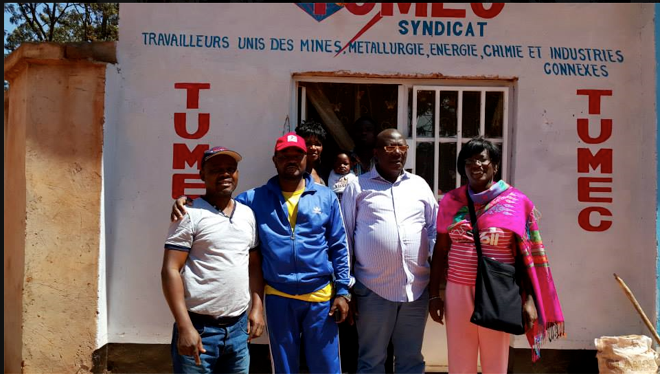19 February, 2016In the heart of the Democratic Republic of Congo (DRC), a country ravished by a torrid past and raging civil war and with little tolerance for different voices, the rise of the Travailleurs Unis dans les secteurs Miniers, Métallurgie, Energie et Chimie Worker’s Union (TUMEC) is an inspirational story of trade unionism.
Formed only in 2011, TUMEC today has more than 10,000 members from seven provinces. Workers have been drawn in by a promise of doing things differently. Traditionally, trade unionism in the DRC has been shrouded by controversy. For a long time, it remained within the realm of the state and more or less equalled state and private sector interests.
In 1990 as a multi-party system was reinstated, the number of unions increased, producing over 600 unions. Unions emerged as a business model for the benefit of their founders, described as mutually supporting employers, without prioritizing workers’ rights, needs or interest. An open and accepted system of gifts (or bribes) to workers is all too often used to gain votes for union representation.
TUMEC has taken on the challenge to reform, break down barriers and take a new path. It has worked hard to develop a new way of doing things, along with building its own ideological perspective on work relations, representation, equality and leadership. Inspiring leadership and a clear and convincing message are resonating in the difficult conditions and lack of representation that workers have experienced in the DRC.
Through both the Swedish funded IndustriALL Union Building Project and the Dutch funded TUMEC project, TUMEC has succeeded in initiating progressive reforms and increase its attention to serving members, not the other way round.
TUMEC aims to work through a set of principles of unionism in strong contrast to the corruption potential inherent in the established system. TUMEC is working hard to design a more democratic and open system in the appointment of leadership and the management of union affairs.
The most noteworthy has been the slow but thorough construction of trade union systems were almost none existed. TUMEC has increased its focus on strengthening accountability and transparency in the management of union affairs. The union has developed clear mechanisms for combating corruption and enhancing accountability. It has found unique ways to engage with workers and members, not only at work places but also within the community itself, much appreciated by the workers.
Fernando Lopes, IndustriALL assistant general secretary, says that TUMEC’s work in the DRC is ground breaking:
“There is a lot to be learnt from TUMEC’s approach to union building. Many challenges remain, for example in terms of expansion and capacity building, but it is clear that the hard work put into breaking old traditions and instead creating a modern, active union owned by its members has been successful.”
